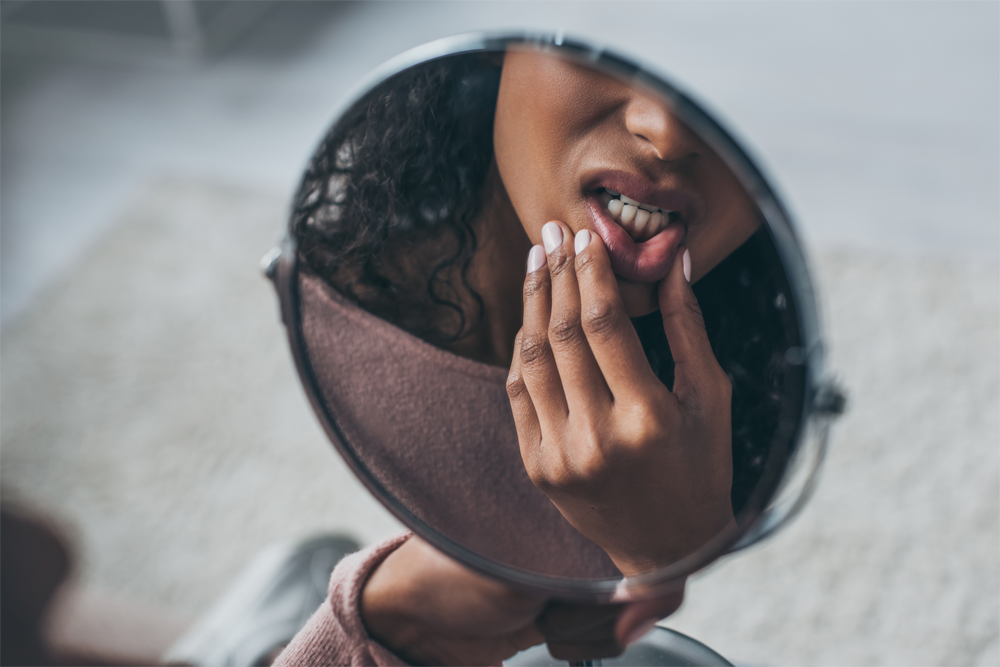The eyes may be the windows to the soul, but doctors are now discovering that our gums are windows to our overall health. In fact, there’s growing evidence that the connection between oral and systemic wellness is deeper than we previously understood. Red, slightly swollen gums that occasionally bleed when you brush or floss might be signaling something more serious than you realize. The question is: are you listening to what your mouth is telling you?
Beyond the Brush: The Surprising Link Between Your Gums and Your Health
Reviewed by Adam Gardner, Licensed Pharmacist & COO of TelyRx

Table of Contents
the mouth-body connection: your gums as health messengers
Think about it: your mouth is the point of contact where your inner world meets the outside world. Every bite of food, every breath of air, every sip of coffee passes through this gateway first. But here’s what most people may not think about: the bacteria living in your mouth don’t just stay put; they travel. They’re constantly interacting with your digestive system, your bloodstream, even your brain.
When gums become inflamed, oral bacteria can enter the bloodstream and travel throughout the body, triggering inflammation in arteries and contributing to atherosclerosis. Modern research has even found bacteria like P. gingivalis—a common cause of gum disease—in the brain tissue of Alzheimer’s patients.
Traditional Chinese Medicine understood this intricate connection centuries ago and has long viewed the gums and teeth as a window into a person’s overall health. Fortunately, this holistic perspective is gaining traction in modern science.
According to a recent review in Nature Reviews Microbiology, research confirms that the same bacterial communities living in our gut also influence our oral health, revealing profound connections between the gums and the body as a whole. The good news is that once you learn to read these signs, you can do something about them.
decoding the early signs of gum disease

Your gums are actually pretty good at sending signals if you know what to look for. That trace of blood on your toothbrush isn’t just a minor inconvenience. It could mean your mouth is trying to communicate something important about your body as a whole.
Here are some of the key early warning signs:
- Blood on your toothbrush or in the sink after brushing or flossing
- Gums that appear redder than usual, especially right at the tooth line
- Puffiness or swelling that wasn’t there before
- Persistent bad breath despite good oral hygiene
- Gums that feel tender to the touch
- Frequent canker sores
Most people chalk these symptoms up to the normal aging process or brushing too hard. But just like any other tissue in your body, your gums don’t bleed without a reason. When they do, it’s a sign of inflammation, which is your body’s response to a bacterial buildup around the gum line. It’s also the first and most common symptom of gingivitis, defined as a mild form of gum disease caused by plaque buildup and inflammation. Left untreated, gingivitis progresses to periodontitis and beyond, which can further affect your entire body.
If you’re experiencing any of these symptoms, you’re far from alone. According to the CDC, gingivitis affects up to 90% of the global population at some point in their lives, and 47.2% of adults over 30 have some form of periodontal disease. While it might be more common than we think, it’s a clear warning sign that shouldn’t be underestimated.
does gingivitis cause other diseases?
The research says yes.
You might be wondering: why should bleeding gums concern me beyond just oral health? The answer lies in where those bacteria actually end up.
Here’s what researchers have discovered: when your gums become inflamed, small breaks or gaps are created in the tissue that allow bacteria to slip into your bloodstream. These traveling bacteria can then cause inflammation and disease in unexpected places.
The gingivitis and heart disease connection has the strongest research backing: According to the Mayo Clinic, having gum disease can increase a person’s risk of heart disease by 2-3 times, and people with gum disease have a 28-66% increased risk of heart attack or stroke compared to those with healthy gums. Why? It turns out that the same bacteria responsible for gum inflammation also contributes to atherosclerosis.
But cardiovascular disease isn’t the only concern. Research shows that gingivitis and memory loss are connected through inflammatory pathways that affect cognitive function. Chronic mouth inflammation can release inflammatory proteins, known as cytokines, that negatively impact your brain. It’s also possible for oral bacteria to travel directly to the brain through nerves or blood vessels, potentially contributing to cognitive decline.
Gingivitis has been linked to increased cancer risk (14% higher overall for women, according to research cited by Time Magazine) and weakened immunity that can leave us vulnerable to respiratory infections, arthritis, even erectile dysfunction. And, because gum disease and high blood sugar can negatively affect each other, poor oral health can make managing diabetes much more difficult.
how to treat bleeding gums at home: your action plan

Here’s the encouraging news: gingivitis is completely reversible in its early stages. Think of inflamed gums as your body’s smoke alarm going off: address the inflammation early, and you’re not just saving your teeth, you might be protecting your heart, brain, and overall health.
Here’s how you can start making a difference right now through your daily routine:
- Gentle, thorough brushing twice daily with a soft-bristled brush.
- Daily flossing (bleeding means you need more consistency, not less).
- Antibacterial mouthwash to reduce harmful bacteria levels.
- Stay hydrated to support your mouth’s natural cleaning system.
Beyond your daily oral hygiene, these lifestyle changes can also support your gums and overall health:
- Favor nutrient-rich foods with vitamin C, vitamin D, and omega-3s.
- Cut back on refined carbs that feed harmful bacteria.
- Manage stress (it suppresses immune function).
- Avoid tobacco (increases gum disease risk by 2-7 times).
the telehealth advantage: skip the wait, get real results
Sometimes home care isn’t enough. That’s when prescription treatments like chlorhexidine oral rinse become game-changers: This oral rinse is stronger than over-the-counter options and penetrates bacterial biofilms that regular mouthwash can’t touch.
The old way? Waiting weeks for dental appointments, taking time off work, and absorbing the high cost of in-office visits. The new way? Access gingivitis treatment online through telehealth platforms that connect you with licensed providers who can prescribe the exact medication you need.
Why Telehealth Makes Sense:
- Get help immediately when you notice symptoms.
- Access prescription-strength treatments delivered to your door.
- Connect with healthcare providers from home with zero dental office anxiety.
- Address problems early before they become serious health issues.
your next steps
Remember, that pink on your toothbrush isn’t just “one of those things”; it’s your immune system sending up flares. When you notice bleeding, swelling, or tenderness, think of this as your gums saying, “We’ve got a bacterial situation that’s starting to affect more than just your mouth.”
What’s amazing is how much control you have here. With a little conscious effort, you can reverse gingivitis and reduce the inflammatory burden on your entire system. Between solid daily habits and easy access to professional treatment through telehealth, there’s no reason to let gum problems persist.
Ready to take action? Whether you start with improving your daily routine or connecting with a healthcare provider through a telehealth platform about prescription treatments, your future self—as well as your heart, brain, and immune system—will thank you for listening to what your gums are telling you right now.
Disclaimer
This blog post is for informational purposes only and does not constitute medical advice, diagnosis, or treatment. The content provided here is not a substitute for professional medical advice, consultation, or care from a qualified healthcare provider. Always seek the guidance of your physician or another licensed health professional with any questions you may have regarding a medical condition or treatment. Do not disregard or delay seeking professional medical advice based on information read on this site. Learn more about our editorial standards here.
